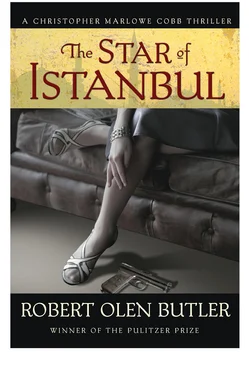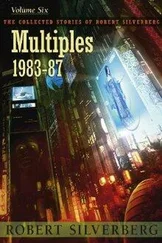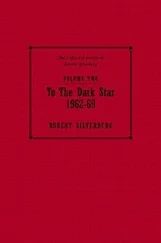I let go and leaped back at once. The blade had gone in deep, I knew. I wanted no part of him now. I straightened upright and from inside the shadows before me came a tightly squeezed cry, remarkably low, remarkably soft, compressed as intensely as our fists had been moments ago, and I felt a sharp pain at my ankle and I jumped back a little. He’d kicked me. But it had not been a conscious blow. The Hun’s feet were shuffling hard, from the pain and the panic and from something like the reflex of a dog struck down by an automobile in the street and lying on its side with its legs still moving as if it could run away from this thing that had happened, run from the pain. It was like that with the Hun: his feet ran and ran and he went nowhere; he could not escape what was happening in the center of his chest. And then the feet stopped running, and they slid a ways toward me as his legs went slack, and the sounds from the shadows stopped, and everything stopped, and he was dead.
I looked left and right. No one was near. This had all happened quickly. He seemed not to have any confederates out here or they likely would have been arriving. I could see the Hun in the deep shadows. He was sitting upright with his back against the door, his head angled to the side. I looked down at his legs. They were stretched onto the sidewalk. I kneeled beside them. I caught his legs at the backs of the knees and raised them so they were out of the way, so that he was in a hunched sitting position in the doorway. He was a drunk sleeping one off. He was bothering nobody. There were plenty of drunks and beggars sitting in the darkened doorways of London. Until an actual bobby came along and decided to poke him, he’d be ignored. I would have a little time.
I picked up the sling from the sidewalk and stuffed it in my pocket. I reached into the darkness beside the dead man and retrieved my cane.
I crossed the street and stood before the window of the booksellers Metzger and Strauss.
The shop was dark and seemingly empty. I moved to the front door. A shade was drawn but I put my eye to the very edge of the pane of glass, and in the narrow gap I could see along the main corridor to the rear of the shop. The stairwell was dark; the office door was closed but its bottom was edged in electric light.
My only question now was how to get in. My lock picks were in my inside pocket. I racked my memory for a crucial detail: was there a bell on the door? I’d gone through only this morning but I could not bring that one sense detail back. I was very good at noticing things and I cursed myself softly at this little slip. I didn’t know if there was a bell. But I had to assume there was. Many shops had bells and no shop in London had a more acute need to be alerted if someone entered than Metzger & Strauss. I did not know how to deal with a doorbell from the outside, especially if it was wired to ring in the back of the shop.
I’d been along this block of St. Martin’s twice. A detail I did remember was a null observation: I saw no passageway back to the courtyard or whatever sat behind these buildings. The whole four-street cincture was likely the same, a monolithic frontage of shops. The way to the rear of these storefronts was through one of them. So I stepped one doorway south, to the Friends Meeting House.
Through the double glass-paned doors there was only darkness. I picked the lock.
I closed the door quietly behind me but left it unlocked. I turned. Only darkness lay before me and I walked into it, the potted plants and wall-hugging furniture of the reception area fading at once from my sight. I lit a match and held it up.
I found the door into the Meeting Room immediately before me. I simply had to keep heading straight to the rear of the building. I opened the door and stepped in as my match flickered out.
But a light remained.
I could see the dim forms of bench seats in rows facing the far platform, where a dozen wooden chairs were lined up. Upon one of the chairs burned a candle. It gave me enough light to find my way to the center aisle and I went down, and as I moved, I saw, in the penumbra of the candle glow, the door out the back of this sanctuary, leading in the direction I wanted. Focused as I was on this, I pulled up with a start at the hunched back and bowed head of a man on the aisle seat of the second row. I was nearly upon him and he’d heard my approach, and now that I’d stopped, he straightened up, but he did not turn.
He wore a stand collar and a dark coat; his head was bare and his hair was white. He spoke without looking at me. “Are you a friend of the truth?” he asked.
I understood this to be a thing some Quakers called each other. But it was also a fundamental question of philosophy and intent. So I said, “Yes.”
“We must not fight,” he said. “The world must not fight. The Lord put that on my heart and I am glad to have said it aloud in your presence.”
I had to move by him now.
With this man, in this room — and the feeling would pass, I knew — but at that moment, I felt suddenly heavy-limbed, felt suddenly empty in the place in my own body where the knife had plunged into the Hun. I felt remorseful. Remorseful at lying to this man, letting him think I was a fellow Quaker, remorseful at what I had just done in the street. I’d killed before, in the past year. Killed, as tonight, in self-defense: after all, I’d let the Hun draw his knife first. But as I stepped even with the old man, and he lifted his face to me, I felt remorseful at how much easier it was to kill than it had been only a year ago, remorseful at how quickly all this remorse would pass.
And the old man looked at me, the candlelight flickering in his dark eyes. He would never lift his hand against anyone. He would sit alone in this place of quiet, and he would meditate with God about how we all should never lift a hand against anyone. And he would be dead wrong about that, as far as the practical world of governments and of modern weapons and of the vast, institutionalized wickedness of humankind was concerned. But he was also right.
“I’m sorry,” I said.
He nodded at me. And he turned his face away and he bowed his head and I beat it out the back door.
The courtyard was very dark and it stank of garbage and waste and it rustled with rats. My remorse was gone and I shuffled my feet not to trip on unseen things, and then I was at the rear door of Metzger & Strauss.
The window I’d passed and the window in the door were painted black.
I expected that trying to pick the lock in the impenetrable dark of this doorway within this courtyard surrounded by these multistoried buildings on this moonless London night would be a tricky business, but I was getting used to my job, and once I found the opening of the keyway with my fingertip and got my pick and torque wrench inside, it was good doing this in the dark. The darkness made it entirely about the feel of things unseen in the keyway, and that was how it should have been anyway. And when the last pin yielded and I felt the shear line go clear and I was ready to rotate the plug, I paused. I focused on being quiet. I eased the plug around and opened the door with the meekest of clicks.
And I froze.
Voices and light.
But not in this room, I quickly realized. And the voices murmured on without a hitch even now, even after the sound of my entry. They were distant, from another room.
Which is what I should have expected. This was the back room I was entering. I’d seen through to it in the rear wall of the bookshop office this morning. I realized that door must still be open.
This was dangerous but it was also an opportunity.
I stepped inside.
Across the rear storage room was the open door to the office, and framed brightly there in modernist composition was a center cut of the refectory table and Brauer’s brown tweedy back overlaid with the curves of a bentwood chair. No eyes were visible.
Читать дальше












